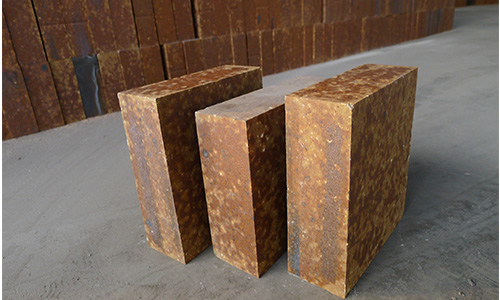Silicon Carbide Mullite Bricks Description
Silicon carbide mullite bricks are made from silicon carbide and high alumina bauxite clinker. There no mullite phase in raw material, but when SiC is oxidized into SiO2 at high temperature, SiO2 can further react with Al2O3 and form mullite(3Al2O3·2SiO2), therefore the main mineral phases of silicon carbide mullite brick are SiC and mullite. Due to the forming of mullite, the density and mechanical strength of silicon carbide mullite brick is improved. Besides it also plays the role of protection film to prevent further oxidization of SiC, and SiC content keeps stable in silicon carbide mullite bricks. Therefore, silicon carbide mullite bricks have good thermal shock resistance, abrasion resistance and corrosion resistance. high strength dense silicon carbide mullite bricks are widely used in all parts of cement rotary kiln, except for sintering zone, and their service life is 3~4 times longer than high alumina bricks.
In recent years, the application of silicon carbide mullite bricks in rotary cement kiln is rapidly developed, especially with the invention of new type dry cement kiln and the enlargement of cement kiln capacity, rotation speed and thermal stress intensity increase greatly, which requires higher performance refractory material, so except for sintering zone, sub-sintering zone, transition zone and cooling zone all can be built by silicon carbide mullite bricks, and the application effect is significantly better than magnesia chrome bricks.
Silicon Carbide Mullite Bricks Characteristics
SiC mullite bricks have good abrasion resistance. Silicon carbide mullite brick’s density, strength and abrasion resistance is significantly better than high alumina bricks and magnesia alumina spinel bricks.
Silicon carbide mullite bricks have high refractoriness under load(RUL) temperature, usually between 1450~1650℃.
Dense structure, can prevent the permeation of molten material, so it has good corrosion resistance.
SiC mullite brick has good thermal shock resistance. SiC has high thermal conductivity and low thermal expansion rate, so SiC carbide mullite bricks have good thermal stability.
Silicon carbide mullite brick has lower thermal conductivity than alkaline bricks, so the heat loss is reduced.
Silicon Carbide Mullite Bricks Physiochemical Index
| Item |
GM1650 |
GM1600 |
GM1550 |
GM1680 |
| Al2O3 % |
63 |
60 |
57 |
63 |
| SiO2+SiC % |
30 |
30 |
30 |
30 |
| Apparent porosity % |
17 |
17 |
19 |
17 |
| Cold crushing strength Mpa |
85 |
90 |
90 |
100 |
| Refractoriness under load ℃ (0.2Mpa) |
1650 |
1600 |
1550 |
1680 |
| Thermal shock resistance(11oo℃, water cooling) |
10 |
10 |
12 |
13 |
| Bulk density g/cm3 |
2.65 |
2.60 |
2.55 |
2.65 |
| Cold abrasion resistance cm3 |
5 |
5 |
5 |
5 |
| Thermal conductivity(w/m·k) |
1.7 |
1.7 |
1.7 |
1.7 |
Silicon Carbide Mullite Bricks Application
Due to silicon carbide mullite brick’s good high temperature performance, it is widely used in large size rotary cement kiln. For some kilns, expect for sintering zone(about 20m long) is brick worked by direct bonded magnesia chrome bricks, kiln hood and kiln end(about 0.8m) are casted by castable, all the rest parts are built by silicon carbide bricks. If direct bonded magnesia chrome bricks are used at the part behind sintering zone, i.e., sub-sintering zone, the kiln coating is difficult to be adhered, but if SiC mullite bricks are used here, the service life is significantly longer.
Besides, silicon carbide mullite bricks are also widely used in steel industry, nonferrous metals industry, chemical industry and so on.

